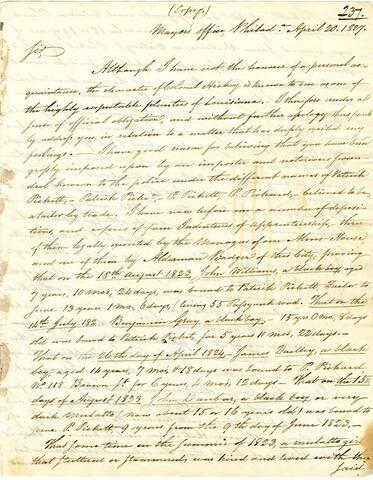The Joseph Watson Correspondence digital collection, contributed by LSU Special Collections, offers insight into the precarious freedom of antebellum black northerners through the story of a Philadelphia mayor’s attempt to return free black children who were kidnapped and sold into slavery. The correspondence also offers an example of dialogue between a white northerner and white southerner that smooths over some of the harsh realities of slavery for the sake of cross-regional cordiality.
The collection contains 13 manuscripts focused on the location and attempted recovery of 5 free African American children--listed as John Williams, Benjamin Gray, James Dailley, John Dunbar, and Jane Victoire. The children were kidnapped in Philadelphia and sold in Louisiana and Mississippi.
Of particular note are letters between Joseph Watson, a Quaker mayor of Philadelphia, and Philip Hicky, a Baton Rouge enslaver. Watson informs Hicky that a recently enslaved person in his possession is really James Dailley, a free Philadelphian. Watson requests Hicky’s cooperation in freeing Dailley, recovering the other children, and arresting the kidnappers. In reply, Hicky expresses doubts that the children in question were actually kidnapped, and he suggests that abolitionists are deceiving the mayor in hopes of freeing individuals who were legally enslaved.
Watson flatters Hicky in hopes of recovering the kidnapped children. In his efforts to convince Hicky to cooperate with the release of the kidnapped children, Watson addresses him as “one of the highly respectable planters of Louisiana,” and writes of his assurance that “this infamous and cruel act of kidnapping will produce the same feeling of indignation with you, that it has excited [in Philadelphia].”
In return, Hicky gestures toward polite cooperation, writing that he was “concerned to learn that I had possibly been most unconsciously...instrumental in depriving a human being of his dearest and most sacred rights.” However, he goes on to express doubt that the child in question was in fact kidnapped, speculating that the “free negroes who have infested our state and inveigled away our slaves” are fabricating the story of the kidnapping.
The letters in the Joseph Watson Correspondence digital collection provide a glimpse of the instability of black freedom, even in the North, and demonstrate ways in which white northerners and white southerners sometimes couched their conflicts in seemingly harmonious language.
Also included in the collection are: letters between Watson and Samuel P. Garrigues, the High Constable of Philadelphia, about actions taken in recovering the children; a letter recruiting people in New Orleans to ensure the children are sent home; a letter concerning a reward for men who helped rescue other kidnapping victims; a letter noting the death of one of the children returned by Hicky.
ADDITIONAL RESOURCES:
Finding Aid for this collection:
https://www.lib.lsu.edu/sites/default/files/sc/findaid/1872.pdf
Book about this kidnapping, which cites the Waston Correspondence collection:
Bell, Richard. Stolen: Five Free Boys Kidnapped into Slavery and Their Astonishing Odyssey Home
Book on the history of kidnapping free African Americans:
Related Collections:
A 400-item collection of Joseph Watson correspondence at the Historical Society of Pennsylvania


